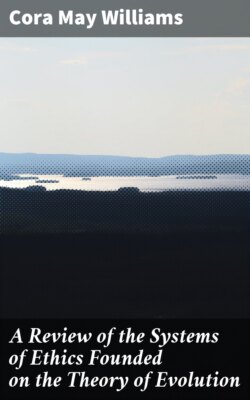Читать книгу A Review of the Systems of Ethics Founded on the Theory of Evolution - Cora May Williams - Страница 10
На сайте Литреса книга снята с продажи.
FOOTNOTES:
ОглавлениеTable of Contents
[24] For criticism of these arguments, see Romanes, "Mental Evolution in Animals," p. 225, etc.; also "Animal Intelligence." In his second edition of this book (1891), Wallace notices a few of the instances cited by Romanes in objection to his theory: such as the recognition of the hen's call by a chicken hatched in an incubator, the fear shown, on the other hand, at the note of a hawk, and the fear exhibited by most young animals at the voice or presence of their natural enemies. Of these he says, however: "But in all these cases we have comparatively simple motions or acts induced by feelings of liking or disliking, and we can see that they may be due to definite nervous and muscular coördinations which are essential to the existence of the species. That a chicken should feel pleasure at the sound of a hen's voice, and pain or fear at that of a hawk, and should move towards the one and away from the other, is a fact of the same nature as the liking of an infant for milk and its dislike of beer, with the motion of the head towards the one and away from the other when offered to it." Of two authentic cases of the building of a nest by young birds, without instruction, he says that, in one case (that of ring-doves), the nest is a very simple one, and that the birds also received some assistance; and in the other case the nest was not built with the neatness ordinarily characteristic of the species. (See "Natural Selection and Tropical Nature," pp. 108–112.) The most of Romanes' instances and arguments he does not notice or answer.
[25] In his second edition, Wallace writes "not only innate ideas, but innate knowledge."
[26] In the second edition of this book, Wallace maintains the same position with regard to skull-measurement as a criterion of mental capacity. Nor does he notice distinctions in skull-form or the proportions of different parts of the brain to each other, except in the one case of the Eyzies.
[27] See Wallace on "Miracles and Modern Spiritualism," "The Psycho-physiological Sciences and their Assailants," and "The Scientific Aspect of the Supernatural."
[28] Wallace omits this particular clause in his second edition.
[29] The second edition reads "is, or pertains to."
[30] Pp. 442, 443.
[31] This is contradictory of the passages on the subject of life above noticed as occurring in the "Contributions to Natural Selection," and retained in the second edition of that book.
[32] P. 463.
[33] P. 444.
